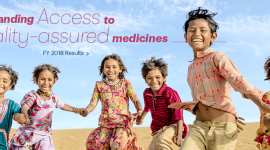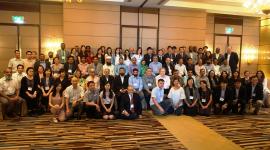Globally, 2.7 million babies die during their first month of life—16 percent of these deaths are from sepsis, meningitis, or tetanus.1
Despite this dire statistic, preventive medicine can significantly reduce newborn mortality when it is affordable and available. Chlorhexidine, an antiseptic used to clean umbilical cords, can reduce the risk of newborn death by 23 percent.2 Quality-assured chlorhexidine, when produced locally, costs pennies per patient—but without a local supply, countries are vulnerable to fluctuations in foreign pricing and availability.

The use of chlorhexidine gel on newborns is effective in preventing life-threatening sepsis and umbilical cord infections.
For years, global health workers and government officials in Pakistan advocated for a local source of chlorhexidine, with little success. However, recognizing the high rate of newborn mortality in Pakistan and the opportunity to leverage its global experience helping low- and middle-income countries to produce quality medicines, the Promoting the Quality of Medicines (PQM) program began work in late 2015 to identify Pakistan-based manufacturers that could produce quality-assured chlorhexidine. Of the potential companies identified, many felt that producing quality-assured chlorhexidine gel was neither technically feasible nor commercially viable.
To respond to these concerns, PQM helped to conduct gap analyses of manufacturers, instituted corrective and preventive actions of the findings, trained local staff, standardized testing techniques and protocols, and helped the manufacturers apply for government approval to produce chlorhexidine. PQM is also building the capacity of the Drug Regulatory Authority of Pakistan and the Ministry of National Health Services, Regulations & Coordination—efforts intended to help expedite the medicines registration process and establish a fair price for medicines like chlorhexidine. PQM’s work paid off: in March 2017, two manufacturers, ATCO Laboratories Ltd. and Aspin Pharma Ltd., became the first ever in Pakistan to receive government authorization to produce chlorhexidine. With this authorization, a dose of chlorhexidine now costs just 14 cents—one-third the price of chlorhexidine in neighboring Nepal.
PQM identified, supported, and worked toward market authorization for two manufacturers of chlorhexidine gel in Pakistan.
In a matter of months, locally produced, affordable, quality-assured chlorhexidine is expected to reach health facilities across the country, dramatically expanding chlorhexidine’s availability and reducing the price of an essential medicine for newborns. This USAID investment through the PQM program has the potential to save thousands of newborn lives every year.
1 Liu, L., et al. (2016). Global, regional, and national causes of under-5 mortality in 2000-15: An updated systematic analysis with implications for the Sustainable Development Goals. The Lancet, 388, 3027–3035. http://dx.doi.org/10.1016/S0140-6736(16)31593-8
2 Imdad, A., et al. (2013). The effect of umbilical cord cleansing with chlorhexidine on omphalitis and neonatal mortality in community settings in developing countries: A meta-analysis. BMC Public Health, 13(Suppl. 3):s15. http://dx.doi.org/10.1186/1471-2458-13-S3-S15



